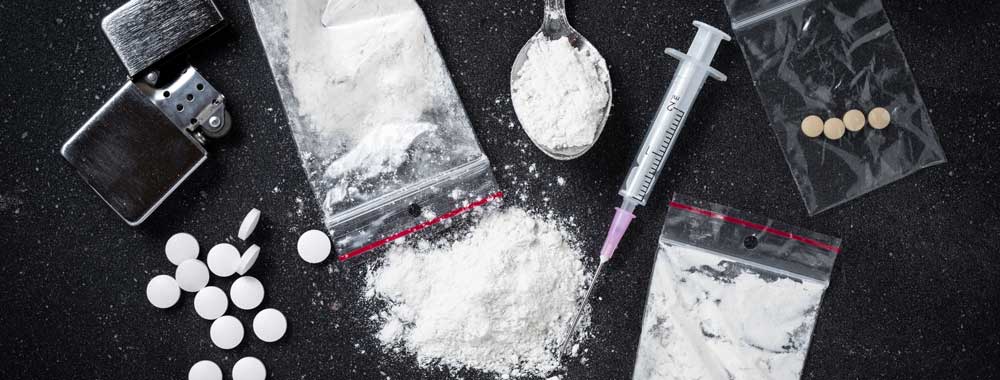Why Do People Get Addicted to Heroin?
Last Updated on October 25, 2023

Have you ever wondered how people get addicted to heroin? Many substances can lead to addiction, but heroin is among the worst because substantial effects on the body and mind make it a difficult drug to combat. With all the drugs out there, how can you tell if a person has formed a heroin addiction?
What Is Heroin?
Heroin is made from morphine, which is derived from the seed pods of the poppy plant. Morphine is often used as a strong pain reliever in hospitals. Heroin is a more concentrated, synthesized form that is rendered in its pure form as a white powder or mixed with other substances, such as sugar, starch, powdered milk, or quinine. This powder can be smoked, snorted, or injected.1
It may also appear as a sticky, dark substance, often called black tar heroin. This form of heroin is not as pure as the white powder because it is not as highly processed. Created by drug cartels in an attempt to cut costs and increase profits, black tar heroin use in the United States is on the rise as a result of its low price.
How Is Heroin Used?
According to the most recent National Survey on Drug Use and Health (NSDUH) available in 2021, around 745,000 people reported using heroin in the past year and 438,000 people met the criteria for having heroin use disorder.2
Because pure heroin is a powder form, snorting is a popular method of consumption, but it isn’t the only possibility. In powder form, heroin may be smoked as well. These options bypass the necessity of a needle, which may be appealing to newcomers.
Injection is the other option for heroin use.3 Seemingly the most painful, injection also provides the greatest high. While smoking or snorting don’t require needles, they also do not provide the same immediate rush of euphoria that begins within seconds after injection. Because needles leave marks on the body, a person may attempt to hide the injection sites in concealed places, including between the toes.
Can You Get Addicted to Heroin On Your First Try?
Although heroin is highly addictive, you can’t get addicted to it after one dose. Heroin addiction develops after a physical dependence on the drug occurs, and that requires time and repeated heroin use.4
According to the National Institute on Drug Abuse, about one-quarter of people who try heroin will get addicted.5 While using it once isn’t likely to cause addiction, it does have the potential to introduce you to a dangerous lifestyle and habits of drug use.
The more frequently you use heroin, the quicker your brain will become accustomed to the chemical changes, and the more heroin you’ll need to use to achieve the same euphoria you felt the very first time you used it.
Why Is Heroin So Addictive?
Whatever method is used, heroin has a definitive impact on the body. The influx of heroin into the brain wreaks havoc on the pleasure and pain centers of the brain. When it enters the brain, it is metabolized into morphine and overwhelms the opioid receptors.6
Consistent use leads those receptors to depend on that influx of morphine, which in turn triggers the addiction. When the brain is deprived of heroin, those receptors go into overdrive, creating the pain associated with withdrawal.
Once the initial euphoria of heroin begins to subside, a person may feel drowsy, slipping in and out of consciousness. Limbs become heavy, the skin flushes, and concentration is difficult. As use continues, the body becomes accustomed to this state and needs increased quantities of the drug to reach the same sensation.
Who Is At Risk for Heroin Addiction?
While it’s true that not everyone who uses heroin will become addicted, certain people may be more likely to abuse heroin and develop a physical dependence or addiction. Some factors that increase a person’s risk include:7
- Prescription painkiller addiction: According to the CDC, this is the strongest risk factor for developing a heroin addiction.8 Many people who misuse heroin first start out abusing prescription painkillers. However, narcotics are difficult to get and are expensive. Heroin, on the other hand, is easily accessible, cheaper, and provides the same euphoric effects.
- Young age: People who begin using drugs at an early age (particularly teens and young adults) are more likely to develop substance use disorders.
- Genetics: Researchers have been able to isolate gene sequences that indicate a greater risk of addiction.9 That means certain people are more inclined to abuse drugs or alcohol due to their genetics (although home environment plays a big role too). People with immediate family members who experienced addiction may be more likely to abuse drugs too.
- The method and frequency of use: Injection drug use is associated with substantially more substance abuse-related problems, including addiction. That’s because the drug delivers a powerful dose to the brain very quickly, which increases the risk for physical dependence.10
- Polydrug abuse: Most people who use heroin use at least one other drug. In addition, people who use cocaine are 15 times more likely to be addicted to heroin and those who use marijuana are 3 times more likely to be addicted to heroin.
- Co-occurring disorders: People with untreated psychiatric disorders like depression, anxiety, PTSD, or bipolar disorder are more likely to suffer from a substance use disorder too.

Mental Illness and Heroin Addiction
Research shows substance use disorders occur at high prevalence with mental disorders like bipolar disorder and depression. The same is true of addiction and anxiety disorders. However, this doesn’t necessarily mean that one caused the other, even if one was diagnosed before the other.
One research report from the NIDA attributes the connection between mental illness and addiction to three primary factors:11
- Substance use disorders and mental illness share many risk factors: Risk factors like extreme stress, trauma, and other environmental factors can contribute to mental illness and substance abuse. Both substance use disorders and mental illnesses also involve the same areas of the brain as well as the same neurotransmitters, such as serotonin, dopamine, GABA, and others.
- Mental illness may contribute to substance use and addiction: Experts hypothesize that individuals with undiagnosed mental illnesses may use drugs and alcohol to self-medicate. The drugs may temporarily reduce symptoms of mental illness, but in the long run, they will only make them worse.
- Substance use and addiction may contribute to the development of mental illness: Abusing drugs and alcohol can lead to brain changes in the same areas that are disrupted by mental health conditions like depression, schizophrenia, or anxiety disorders.
How Do Prescription Opioids Lead to Heroin Abuse?
As previously mentioned, prescription opioid abuse is one of the strongest predicting factors that a person will also develop heroin addiction. Some people who take prescription opioids become physically dependent on them, especially if they use them for several weeks. From there, addiction can develop with continued, more frequent use.
However, obtaining prescription opioids isn’t always easy. Some people may “doctor shop,” which refers to the practice of getting the same prescription from more than one doctor. Others may buy prescription painkillers illegally online, from a local dealer, or a friend of a friend.
If a person is unable to get painkillers and they are addicted, they might do anything to avoid experiencing uncomfortable opioid withdrawal symptoms. This includes resorting to a different drug that will provide similar effects.
Heroin offers the same powerful, euphoric side effects with a lower price. It’s also easier to get, making it a convenient and reliable alternative for many people who are addicted to prescription painkillers.
How Is Heroin Addiction Treated?
There are several types of treatment methods that research has proven to be effective in treating heroin addiction. However, depending on a person’s unique needs, one or more approaches may work better than others. Treatment should always be individualized for the best chance at a full recovery. Medicines and behavioral therapies are both effective to treat heroin addiction. Typically, someone who is addicted to heroin needs to complete an inpatient or outpatient detox program before they begin rehab.
Medicines to treat heroin addiction
Medication such as methadone and buprenorphine bind to the same opioid receptors in the brain that heroin does. However, it’s a weaker bind, which reduces cravings and withdrawal symptoms. Naltrexone can also treat heroin addiction by blocking the drug from binding to opioid receptors in the body, and thus, preventing it from having any effect.
Behavioral therapies to treat heroin addiction
Certain types of behavioral therapies including cognitive-behavioral therapy and contingency management are also effective. They work by helping the person modify their thought and behavior patterns, manage triggers and stress, and establish healthy expectations for life. Contingency management provides incentives to reward positive behavior, such as staying sober or completing 12-Step Program work.
Medication and therapy can be used in conjunction to treat heroin addiction. Many addiction treatment centers do so, including our drug rehab in Austin and intensive outpatient programs (IOP) to give clients the best opportunity at achieving sustained lifelong recovery. Enrolling in a sober living Austin program can also help individuals sustain long-lasting recovery after they complete rehab.
Being addicted to heroin is a trial that is difficult to overcome. The more it is used, the more the body craves it, leading people into a cycle of need and temporary satisfaction. If you believe someone you know is struggling with heroin addiction, understand what they are suffering through. It may be difficult, but help is available.
Contact our Austin recovery center today if you’re ready to receive help for heroin addiction. The Nova staff is available now to take your call.
References:
- http://www.drugabuse.gov/publications/research-reports/heroin/what-heroin
- https://www.samhsa.gov/data/sites/default/files/reports/rpt29393/2019NSDUHFFRPDFWHTML/2019NSDUHFFR1PDFW090120.pdf
- https://www.uofmhealth.org/health-library/uq2454
- https://drugpolicy.org/drug-facts/can-using-heroin-once-make-you-addicted
- https://www.drugabuse.gov/publications/drugfacts/heroin
- http://www.drugabuse.gov/publications/research-reports/heroin/what-are-immediate-short-term-effects-heroin-use
- https://pubmed.ncbi.nlm.nih.gov/29049118/
- https://www.cdc.gov/vitalsigns/heroin/index.html
- https://www.ncbi.nlm.nih.gov/pmc/articles/PMC2715956/
- https://www.ncbi.nlm.nih.gov/pmc/articles/PMC3225003/
- https://www.drugabuse.gov/publications/research-reports/common-comorbidities-substance-use-disorders/why-there-comorbidity-between-substance-use-disorders-mental-illnesses

